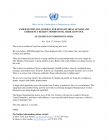GENEVA (17 February 2020) – A United Nations report published today finds that some children in Iraq are still unable to receive education in the aftermath of the territorial defeat of the Islamic State in Iraq and the Levant over two years ago, saying they cannot access schools or obtain key civilian documentation necessary for enrolment in state schools.
The Right to Education in Iraq: The legacy of ISIL territorial control on access to education is jointly released by the United Nations Assistance Mission for Iraq and the UN Office of the High Commissioner for Human Rights. The report is based upon 237 interviews and group consultations with children, youth, parents and teachers in areas that were controlled by Da’esh/ISIL until their territorial defeat in December 2017.
Several of those interviewed said that they could not move freely in and out of IDP camps due to restrictions on their movement, preventing them from daily activities such as attending schools outside the camps. One boy from a displacement camp in Ninewa Governorate said: “There is no future in the camp anyway, what am I going to do here? Why do I need an education for this life? It has been so long since we were at school, our minds feel closed to learning, some of us can no longer even read and write. We have no support to overcome these things. Even if I could take the exams, I would not pass them. I don’t see a future for myself.”
The UN High Commissioner for Human Rights Michelle Bachelet said the importance of the right to education for children and young people cannot be overstated. “When the full enjoyment of this right is impaired for any reason, their lives and futures are severely impacted,” she said. “Inclusive, quality education is not just a right in itself but it is essential for the full realisation of a range of other human rights. Education literally has the power to transform lives and make dreams come true.”
While acknowledging the steps taken by the Government to ensure access to education, the report identifies two main challenges specific to the community. Firstly, the absence of appropriate programs aimed at reintegration of students into the state education system, particularly given that many have suffered a significant time gap in their schooling. Secondly, the impact that limited access to civil documentation is having on school enrolment. The report indicates that these issues have been compounded by the fact that many adolescents have now reached an age that where traditional primary or junior education may no longer be appropriate, that there are an insufficient number of schools or accelerated learning programmes, inadequate teaching hours, and movement restrictions.
The report calls on the Government of Iraq to take measures to overcome existing administrative and security clearance challenges for children to obtain civil documentation and to revise existing provisions of accessible forms of education for children who have missed years of education due to ISIL control.
The report was shared with the Government of Iraq and integrates comments received from the Ministry of Education, annexed to the report.
“Access to education must be guaranteed for every Iraqi child,” said Danielle Bell, Chief of UNAMI Human Rights Office. “Alternatives for those who missed out on their school years due to conflict must be found.”
ENDS
For the English and Arabic versions of the report, please click here
For more information and media requests, please contact: Rupert Colville – + 41 22 917 9767 / rcolville@ohchr.org or Jeremy Laurence – + 41 22 917 9383 / jlaurence@ohchr.org or Liz Throssell – + 41 22 917 9296 / ethrossell@ohchr.org or Marta Hurtado – + 41 22 917 9466 / mhurtado@ohchr.org



